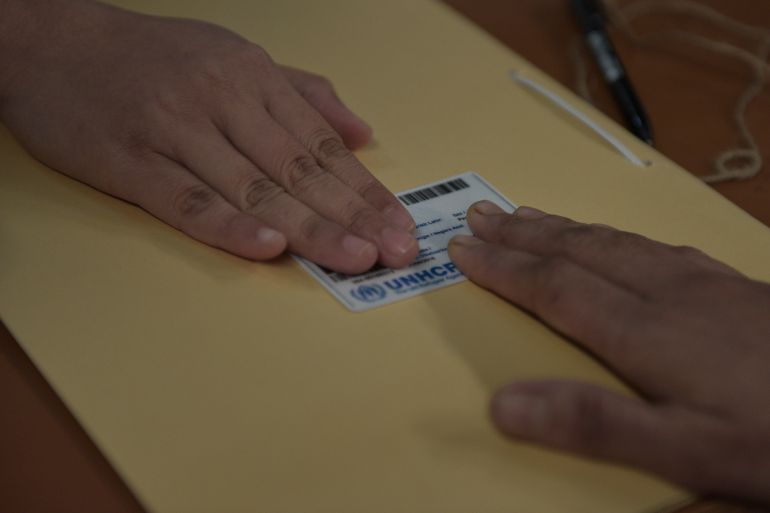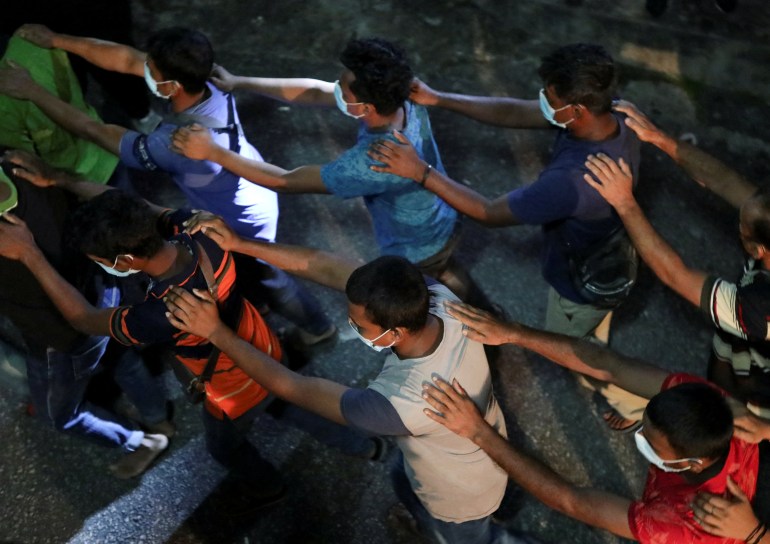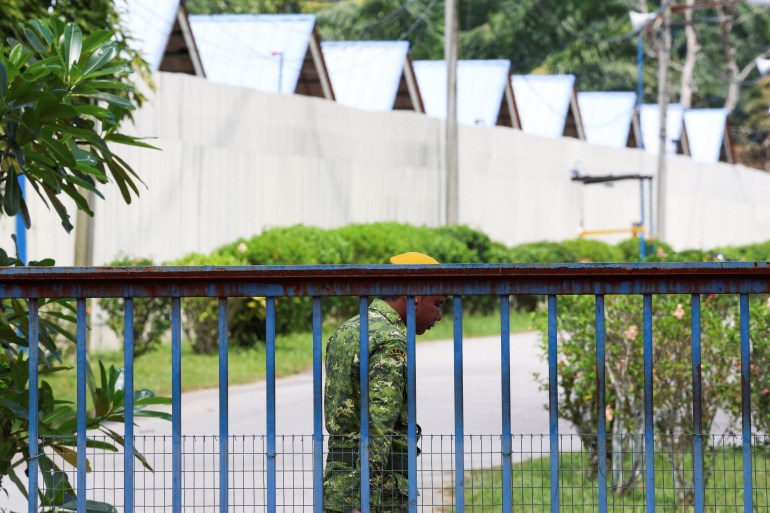In legal no-man’s land, refugees in Malaysia struggle to eat, pay rent
Malaysia government tells UN review that it has no plans to change system under which refugees are considered undocumented migrants.

Kuala Lumpur, Malaysia – It is late afternoon in Kuala Lumpur and in the harsh heat, Zabi* concludes his third visit to the doctor in a month, still unsure of what is causing his excruciating stomach aches despite all his reports being normal so far.
He worries about paying for the doctor as, being a refugee, he does not have much money or any medical benefits.
Keep reading
list of 4 itemsMalaysia charges four Thais over mass graves, trafficking camps
Malaysia pressed to probe deaths of 150 foreigners in detention
Syrian refugee who lived in airport gains Canadian citizenship
When Zabi came from Afghanistan to Malaysia as a teenager five years ago, he had no choice but to fend for himself. His family had only enough money for one of them to flee.
“I know it’s illegal for a refugee to work in Malaysia. But I have no choice as an orphan, as I have no trace of my family at the moment. I work around 18 hours a day and I hardly get paid four ringgit ($0.88) an hour,” the 18-year-old told Al Jazeera.
Zabi is working as a housekeeper in a Malaysian-owned hotel in Kuala Lumpur but because he is a refugee and not officially allowed to work, he has no written contract.
He has had a series of other jobs – as a security guard, in restaurants and in customer service – and lives a precarious existence, struggling to make enough money to pay his 500 Malaysian ringgit ($106) monthly rent.
“After extremely exhausting long working days, Maggi instant noodles are something I eat most days,” he said.
Malaysia has no formal framework for refugees, which means they are left in a legal no-man’s land where they are vulnerable to exploitation by those who do employ them. Under Malaysian law, refugees are also no different to undocumented migrants who are often targeted in official crackdowns.

Asked about refugees at the United Nations last month, the Malaysian representative defended the government’s approach and indicated that there was no room for change.
“Who is the deserving refugee? Who is a deserving asylum seeker? Who is an economic migrant? Who is to determine them as such?” Foreign Affairs Ministry Deputy Secretary General (multilateral affairs) Bala Chandran Tharman told the Universal Periodic Review (UPR) in Geneva, according to the Malay Mail.
Lack of legal protection
While Malaysia is a member of the UN, it has never signed the 1951 Refugee Convention and there are no laws (PDF) in place to recognise and provide for those fleeing persecution and conflict.
Refugees also have no right to work, attend school or access medical care.
Registration with the local office of the UN High Commissioner for Refugees (UNHCR) provides some measure of protection and support, including limited access to healthcare, education and other services provided by the UN and its partners.
“This is only an identity document and has no formal legal value in Malaysia,” the UNHCR website notes of the card given to all those registered with it.
In 2022, the Malaysian government said all asylum seekers and refugees would need to register under the government’s Tracking Refugees Information System (TRIS), which was launched in 2017.
The TRIS website talks about safety and the risk of social problems linked to the influx of refugees but suggests registration may allow cardholders to work in some, mostly unskilled, areas.
“The lack of legal protection forces refugees to work illegally, and most of the jobs that they find are 3D jobs, the ‘difficult, dangerous, and dirty’ kind of work that Malaysians try to avoid,” said Jana Stanfield, the co-founder of Together We Can Change the World and founder of the Refugee Film School in Kuala Lumpur.

Without legal protection and proper contracts, many do not receive Malaysia’s national minimum pay (introduced in May 2022) of 1,500 Malaysian ringgit ($329) per month or 7.21 Malaysian ringgit ($1.64) an hour.
Zabi, who spent five months learning English after arriving in Malaysia in 2018, says the boss at the security firm where he once worked had agreed to pay him about 1,000 Malaysian ringgit ($219) a month but never did.
Even now, he is forced to do overtime, which is unpaid, and work in other roles to meet his employer’s needs. He told Al Jazeera he has to agree to these conditions, having no alternative.
‘Win-win’
More than 70 percent of the 185,000 refugees in Malaysia registered with the refugee agency are of working age. According to information gathered from refugee communities, most make a living in restaurants, retail and other service jobs as well as agriculture and construction.
“It is a ‘win-win’ for Malaysia, as it would take into consideration both the humanitarian needs of refugees, whilst also benefiting the Malaysian economy as it recovers from the social and economic impact of the pandemic,” UNHCR spokeswoman Yante Ismail said in a statement to Al Jazeera about allowing the community to work legally.
Malaysia has allowed certain groups of refugees to join the workforce in the past.
In 2015, some Syrians were allowed to work and send their children to school under a scheme based on an initiative in the early 1990s for Bosnians fleeing the Balkan wars.
“Malaysia can allow refugees to exercise their right to work under an existing legal framework … and then this can be expanded to include education and healthcare,” said Mahi Ramakrishnan, an investigative filmmaker and activist based in Malaysia. “The question is whether the government has the political will to do so.”

In 2017, a pilot project allowed about 300 Rohingya refugees with UNHCR cards to work legally in the plantation and manufacturing sector, but was not adopted.
In October, the Human Resources Ministry said refugees might be allowed to work officially in the so-called “3D jobs” amid shortages of workers who are usually brought in through government-backed arrangements from countries such as Bangladesh and Indonesia. Those schemes are currently under review as Malaysian seeks to regularise its policies on foreign workers.
Ultimately, refugee advocacy groups say the government needs to take the lead on any policy change.
“To grant refugees the right to work is to ensure that they are able to have access to livelihood that is safe, decent and dignified,” Hui Ying Tham, the executive director at Asylum Access, told Al Jazeera. She stressed that the implementation of this “requires a multifaceted approach with the government leading, in consultation with refugee communities, the changes in laws, policies and attitudes to create a framework that recognises and supports the rights and potential of refugees.”
Tham added that work should also recognise the skills and experience of the individual refugees as it does with any other member of the workforce.
Abolfazly*, an Afghan refugee school teacher whose village was burned down by the Taliban, agreed.
“We had a life before taking refuge in another land,” he said. “We’re educated, we’re resourceful. Host countries like Malaysia can use us – not only in agriculture but in their socioeconomic development,” said the 28-year-old, who is working on finishing his PhD in law.
The UNHCR remains hopeful that there will eventually be a resolution, although the latest comments at the UPR suggest that might not happen soon.
For refugees like Zabi, that means continued struggle.
“I want to go to university. I love learning new languages,” he told Al Jazeera. “Right now, my life is all about eating, sleeping and working. I have no plans for the future because I know none of the plans will work. But I’ll still keep trying – like I always do.”
*Pseudonyms have been used to protect the refugees’ identity